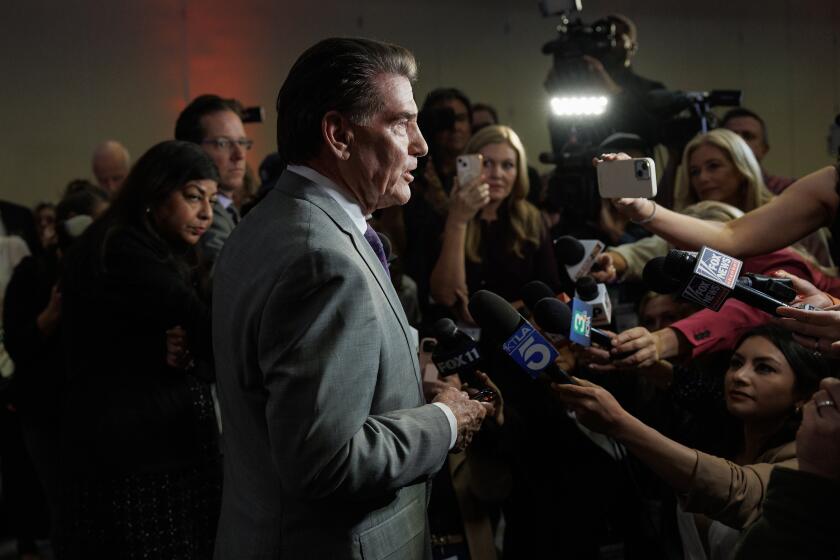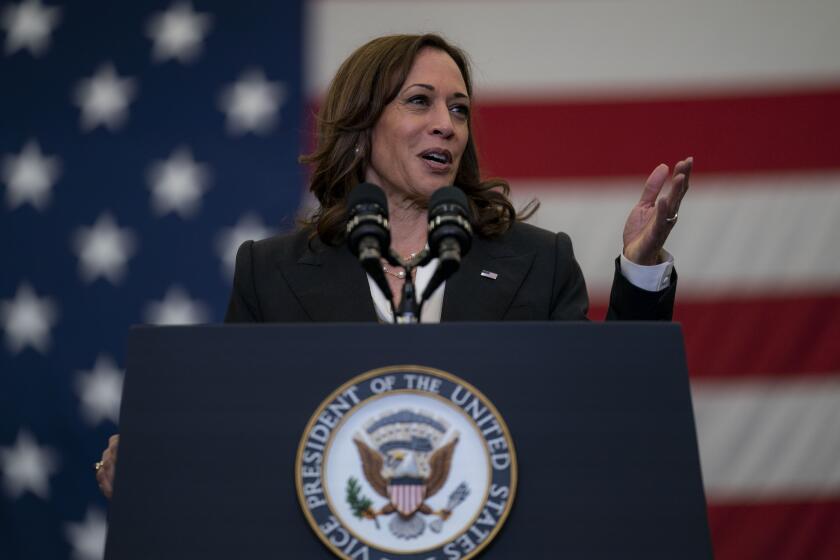Measure H, Up Close and Personal
Last week, the day before the election, Los Angeles City Councilman Michael Woo rehearsed a graceful speech conceding defeat of the ethics control-pay raise measure.
Like all the other City Hall insiders, Woo figured Measure H was a loser. Nobody, they thought, would support ethics reform and public financing of city election campaigns if it meant a pay raise for the mayor, the City Council, the city attorney and the controller. To the insiders’ amazement, Measure H won.
There are several reasons why. For one, some voters said they didn’t realize Measure H increased salaries. Scandals at City Hall created an appetite for reform. Also, there was no organized opposition. But of all the reasons, the most fascinating is how human relationships--old, complicated and always shifting--shaped the campaign.
The human quotient came into play in March when Steve Glazer, the campaign manager, looked at a poll showing most voters opposed the pay raise. Glazer is a youthful mixture of idealism and deadly pragmatism. In this case, pragmatism ruled. He and the rest of the campaign team decided they’d better play down the pay raise, if not hide it. That meant avoiding news coverage.
“Reporters doing their job would tell both sides of the story,” he said. “We had to have a controlled campaign.” .
In other words, what Glazer needed was a sneaky kind of campaign that would spread the word quietly.
Mailed advertising was the answer. Glazer had to secure endorsements on several of the slate mailers put out by political consultants in the community. In particular, he needed a place on the most famous of the slates, the BAD slate mailer, which circulates widely in high voting neighborhoods on the Westside, Southwest Los Angeles and in the San Fernando Valley.
BAD is the acronym for the political consulting firm of Michael Berman and Carl D’Agostino, who have defined pragmatic politics with their mailed advertisements, artfully written to appeal to the city’s diverse constituencies. One of their most powerful mailings comes just before the elections. It’s an official looking piece of paper labeled “Primary Slate for Democrats.” Actually, those on the slate are not officially endorsed Democrats. In fact, the candidate at the head of the slate, Dianne Feinstein, had been refused endorsement for governor by the state Democratic convention. She, like the others, had paid Berman and D’Agostino for a place.
It takes more than money to get on the slate. BAD is the political arm of the Berman-Waxman organization, which dominates Democratic party affairs on the Westside and in parts of the Valley.
The Berman-Waxman organization means old relationships. Berman is Rep. Howard Berman of Studio City, Michael’s brother. Waxman is Rep. Henry Waxman of Los Angeles. They’ve been a team since the ‘60s. Michael showed his computerized mailing genius years ago when Henry won an upset victory in a race for state Assembly and Michael ran the embryonic political postal service. “It’s not enough to offer to pay,” said Councilman Woo. “You have to get them (the organization) to agree to put you on, and then you talk about price.”
That seemed impossible. The organization’s old ally, Los Angeles City Councilman Zev Yaroslavsky, was a leading opponent of Measure H. The word on the street was that the Berman-Waxmans would never go against Zev. Michael Berman and D’Agostino had handled his abortive 1988-89 campaign for mayor.
But relationships change. The tough Berman-Waxmans began cooling on Yarolavsky after he precipitously pulled out of the mayoral race in 1989. The organization was convinced Yaroslavsky would have won. Berman-Waxman people can’t stand a Hamlet. In fact, some of them have completely cooled off on Yaroslavsky. Afraid he’ll do another Hamlet in the next election, some of them are convinced Mayor Yaroslovsky is not to be and are trying to persuade Howard Berman to come back from Congress and run for mayor in 1993.
Other friendships came into play. Geoff Cowan, head of the citizens ethics commission that conceived Measure H, talked to his old friend and former law partner, Rep. Mel Levine of Santa Monica, another Berman-Waxman leader. Measure H backer John Phillips, chairman of California Common Cause, worked on his friend Howard Berman to overcome some of the congressman’s objections to the plan.
Waxman, Levine and Berman endorsed Measure H. Michael Berman and D’Agostino opened their slate to the measure. By then Woo had raised enough for a $200,000 advertising campaign. The H campaigners paid $30,000 to Berman and D’Agostino and were endorsed on 1.5 million pieces of mail. Glazer bought space on other slates.
The heart of it, campaigners said, was the BAD slate. Shifting friendships made that possible. They allowed Mike Woo to throw away his concession speech and ad lib some words of celebration. “I’m still trying to get over it,” he said.
More to Read
Sign up for Essential California
The most important California stories and recommendations in your inbox every morning.
You may occasionally receive promotional content from the Los Angeles Times.






